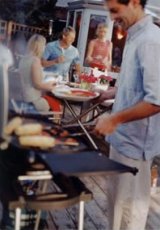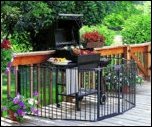The Top 10 Causes of Serious Burns to People and Pets in the Home
by SixWise.com
Every year in the United States, more than 2.2 million people suffer
from burns. Of these, close to 1 million seek emergency treatment and
3 percent to 5 percent sustain life-threatening injuries. Says Roy Alson,
MD, PhD, associate professor at the Department of Emergency Medicine,
Wake Forest University School of Medicine, burn injuries leave 60,000
people hospitalized each year in the United States, and over 5,000 people
die from burn-related injuries.
How Burns Affect the Body
With the skin being the largest organ of the body, when it gets burned
many bodily functions are compromised. Think about it; the skin:
- Helps regulate body temperature and prevents body fluids from evaporating
- Provides a barrier against infection
- Contains sensory receptors that provide information about the environment
When the skin gets burned, all of these most basic and necessary functions
can suffer, with one of the most serious being that the body's resistance
to infection can go down tremendously. In fact, according to the National
Institute of General Medical Sciences, up to 10,000 people in the United
States die every year of burn-related infections such as pneumonia. Fortunately,
about 75 percent of all burns are preventable, says eMedicine's Burn Center,
particularly if you're aware of the top causes of burns that exist in
your home.
|

Barbecues are a popular summer pastime, but if grills aren't protected
kids and pets could risk serious burns.
|
1. Barbecue grills. With the summer season nearing, many of us
are dusting off the barbecure, but beware that they can pose a major burn
risk, especially to kids. "From grills to barbecue pits, parents
need to make sure their children avoid any area near an open flame,"
said Kim Davies, trauma manager at Children's Medical Center of Dallas.
"This is especially important as you begin heating up a grill--it's
not hot enough for food, but it's hot enough to burn."
The HearthGate™
barbecue and fireplace protection gate is an excellent solution and
a smart investment for anyone with children or grandchildren. It keeps
kids away from the grill and out of harm's way.
2. Clothes Irons. Irons left to cool on low surfaces are responsible
for up to half of burns in toddlers. That's because they haven't yet learned
that touching such objects could hurt them, and as anyone with young children
knows, they'll grab onto anything they can reach. Never leave irons unattended
or in places where children can reach them (or pull them down using the
cord).
3. Curling Irons. Similar to above, curling irons are tempting
for young children to grab, especially when they come in bright colors.
Burnsurgery.org estimates that hot curling irons cause up to 45 percent
of burns in small children. Adults and bigger kids can also be burned
by careless use of these irons.
4. Fireplaces. Fireplaces, particularly the gas variety, are becoming
increasingly popular in homes and condos. While adults can be burned from
tending to the fire or while adding wood, children may reach out toward
the fireplace out of curiosity and fall against the glass doors.
"It only takes seconds for a child to be seriously burned,"
says Amy Zierler, information specialist at Safe Kids Canada, the national
injury prevention program at The Hospital for Sick Children. "Young
children under the age of 5 years, and especially those under 2 years,
are at an increased risk because they are busy exploring and are often
unsteady on their feet."
When a fireplace is in use, the glass barrier doors can reach over 400°F
in only six minutes, and it takes 45 minutes for the doors to cool down
to a safe temperature after the fire has been put out.
"We urge the industry that makes and sells gas fireplaces to warn
consumers of this burn risk and to investigate design changes to help
protect children," says Zierler. In the meantime, The
HearthGate™ barbecue and fireplace protection gate, which was
mentioned above to keep kids safe around the outdoor grill, is also an
excellent way to keep kids clear of dangerously hot indoor fireplaces.
5. Radiators. Since they're cool at times and hot at others, children
may not know to keep away. Adults are at risk from accidentally falling
into one. Those of you with small children and radiators in your home
may want to consider screening
them off, as with the fireplace and barbecue. And never put beds or
cribs near a radiator.
6. Ovens. Like radiators, ovens are hot at times and cool at others,
so children may not perceive it as a risk. Be sure that children are not
nearby when putting or removing items into a hot oven-remember that it
only takes a few seconds for a serious burn to occur.
7. Hot pots on the stove. Scalding burns from hot water are one
of the most common burns to children and pets. For toddlers aged 6 months
to 2 years, the majority of scaldings happen when hot foods or liquids
are spilled onto the child. A pot on the stove looks very tempting to
a curious 2-year-old, and chances are they'll reach out to grab it if
they can reach it.
Never leave pots unattended, and turn handles inward so they don't protrude
out over the edge of the stove where they're easier for small hands or
curious pets to get a hold of. Also, use only the back burners on the
stove when possible.
8. Coffee cups. Though seemingly innocent, a cup of hot coffee
left on a table or countertop can scald a child or pet within seconds.
If you've ever spilled hot coffee in your lap, you know how much it hurts,
but a child is even more vulnerable to the hot temperatures.
|

Hot tap water can scald children within seconds. Always checking
the temperature of bath water before placing kids (or pets) in the
tub can prevent potentially serious burns.
|
9. Hot tap water. According to the National Safe Kids Campaign,
hot tap water accounts for nearly one-fourth of all scald burns among
children and is associated with more deaths and hospitalizations than
other hot liquid burns. The most common place for tap-water burns is in
the bathroom, such as during bath time, and the burns tend to cover a
larger portion of the body and be more severe than other scald burns.
Always test the temperature of the water before placing a child or pet
into the tub or sink.
These burns can be prevented by lowering the setting on your hot water
heater to 120°F or below. Anti-scald devices are also available for
water faucets and showerheads, the Campaign reports.
10. Steam from microwaved foods. When removing covers from food
that has been heated in microwaves, escaping steam can cause scald burns-about
95 percent of microwave burns to children are from this type of burn.
Let food cool adequately before removing it from the microwave and serving
it.
|
Protect Your Kids and Pets From BBQ Grills, Fireplaces-Even
Radiators
 Sure,
grills and fireplaces are great for families, but they also present
an added risk of serious burns to your children and pets. But with
HearthGate
Barbecue and Fireplace Protection Gate, the risk is eliminated! Sure,
grills and fireplaces are great for families, but they also present
an added risk of serious burns to your children and pets. But with
HearthGate
Barbecue and Fireplace Protection Gate, the risk is eliminated!
- Base set fits a 6-feet wide by 2-feet deep hearth
- Five 24-inch wide and 28-inch high interlocking sections (extensions
available)
- Includes a single one-hand open gate that swings in both directions
- Constructed of non-toxic strong tubular steel ... heat-resistant
and easy to clean!
- Black finish blends beautifully with most home interiors
Read
more about the HearthGate Barbecue and Fireplace Protection Gate
Now!
|
And please watch out for pets too. "Animals can get severe burns
just as humans do, and the results can be just as devastating," says
Dr. Robert Kennis, a veterinary dermatologist at Texas A&M University's
College of Veterinary Medicine. So when it comes to burn-proofing your
home, it may be an automatic thought when it comes to children, but don't
forget your four-legged friends need some protection too!
Recommended Reading
The
Six Silent Killers in Your Home: How to Detect and Eliminate Them
Extension
Cords are Far More Dangerous Than Many Realize
The
Ten Most Common Poisons Among Kids
Sources
EMedicine.com:
Thermal Burns
National
Institute of General Medical Sciences
Washington
Families Magazine
Burn
Prevention
The
Hospital for Sick Children
National
Safe Kids Campaign
Texas
A&M University